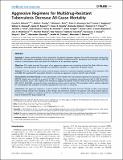Aggressive Regimens for Multidrug-Resistant Tuberculosis Decrease All-Cause Mortality

View/
Author
Alcantara Viru, Felix A.
Appleton, Sasha C.
Atwood, Sidney S.
Chalco, Katiuska
Guerra, Dalia
Joseph, Keith
Llaro, Karim
Mestanza, Lorena
Muñoz, Maribel
Palacios, Eda
Sanchez, Epifanio
Note: Order does not necessarily reflect citation order of authors.
Published Version
https://doi.org/10.1371/journal.pone.0058664Metadata
Show full item recordCitation
Mitnick, Carole D., Molly F. Franke, Michael L. Rich, Felix A. Alcantara Viru, Sasha C. Appleton, Sidney S. Atwood, Jaime N. Bayona, et al. 2013. Aggressive regimens for multidrug-resistant tuberculosis decrease all-cause mortality. PLoS ONE 8(3): e58664.Abstract
Rationale: A better understanding of the composition of optimal treatment regimens for multidrug-resistant tuberculosis (MDR-TB) is essential for expanding universal access to effective treatment and for developing new therapies for MDR-TB. Analysis of observational data may inform the definition of an optimized regimen. Objectives: This study assessed the impact of an aggressive regimen–one containing at least five likely effective drugs, including a fluoroquinolone and injectable–on treatment outcomes in a large MDR-TB patient cohort. Methods: This was a retrospective cohort study of patients treated in a national outpatient program in Peru between 1999 and 2002. We examined the association between receiving an aggressive regimen and the rate of death. Measurements and Main Results: In total, 669 patients were treated with individualized regimens for laboratory-confirmed MDR-TB. Isolates were resistant to a mean of 5.4 (SD 1.7) drugs. Cure or completion was achieved in 66.1% (442) of patients; death occurred in 20.8% (139). Patients who received an aggressive regimen were less likely to die (crude hazard ratio [HR]: 0.62; 95% CI: 0.44,0.89), compared to those who did not receive such a regimen. This association held in analyses adjusted for comorbidities and indicators of severity (adjusted HR: 0.63; 95% CI: 0.43,0.93). Conclusions: The aggressive regimen is a robust predictor of MDR-TB treatment outcome. TB policy makers and program directors should consider this standard as they design and implement regimens for patients with drug-resistant disease. Furthermore, the aggressive regimen should be considered the standard background regimen when designing randomized trials of treatment for drug-resistant TB.Other Sources
http://www.ncbi.nlm.nih.gov/pmc/articles/PMC3596279/pdf/Terms of Use
This article is made available under the terms and conditions applicable to Other Posted Material, as set forth at http://nrs.harvard.edu/urn-3:HUL.InstRepos:dash.current.terms-of-use#LAACitable link to this page
http://nrs.harvard.edu/urn-3:HUL.InstRepos:10605432
Collections
- HMS Scholarly Articles [17920]
Contact administrator regarding this item (to report mistakes or request changes)


